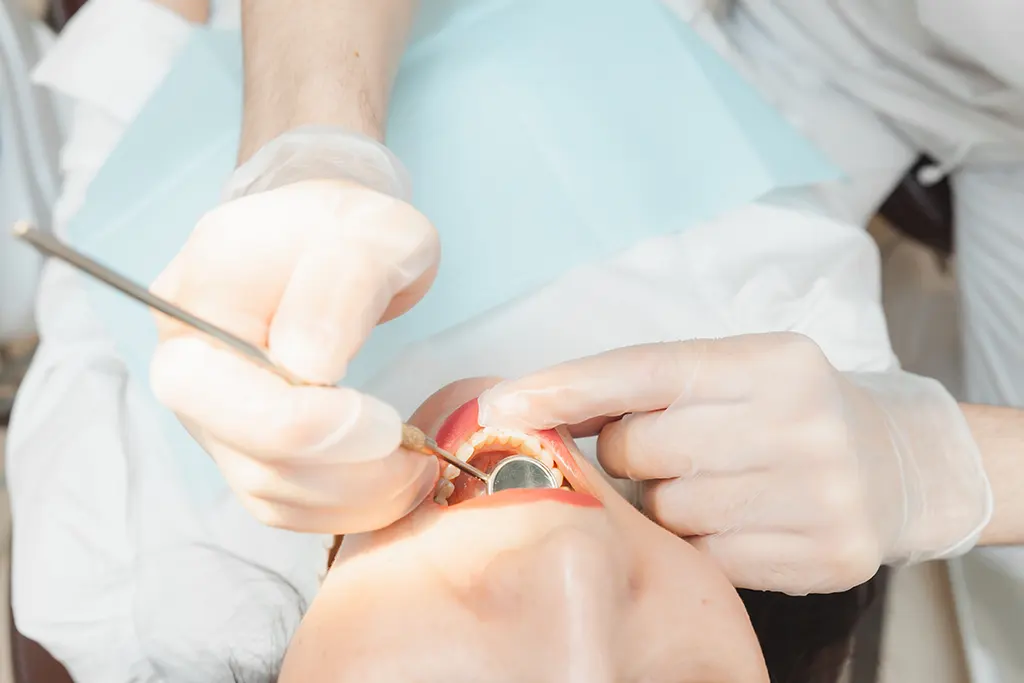When we think about oral care, most people focus on teeth. Brushing and whitening are common concerns. But gum health is just as important. Healthy gums support your teeth, help prevent infections, and protect your overall health. When your gums are unhealthy, gum disease treatment becomes essential to overcoming potential complications. Research shows a strong link between gum problems and systemic diseases. Periodontal disease affects more than just your mouth. Understanding this connection can help you prevent serious health issues while keeping your smile strong.
What Is Gum Disease?
Gum disease, also referred to as periodontal disease, is an infection of the tissues that support your teeth. It starts with plaque buildup. Plaque is a sticky film of oral bacteria that forms on teeth and gums.
If plaque isn’t removed through dental cleaning, dental flossing, and proper brushing, it can harden into tartar. Tartar is much harder to remove and can only be cleared by a dental professional during a dental check-up or dental scaling.
From there, what comes next is a gum disease diagnosis. This type of dental disease progresses in stages. The first stage is gingivitis, which causes oral inflammation, redness, and slight bleeding during brushing. With proper gingivitis treatment, fortunately, the condition can be reversed.
Without treatment, however, it can advance to full periodontal disease, causing gum recession, loose teeth, and eventual tooth loss. Gum infection treatment at this stage often involves more intensive procedures to restore gum tissue health and control infection.
Gum Disease Symptoms and Risk Factors
It’s important to recognize gum disease symptoms early. This ensures you can have a minor issue treated before it becomes a major problem for your health and potentially require emergency dental intervention.
Common signs of gum disease include red, swollen, or tender gums that cause pain; bleeding during brushing or flossing; persistent bad breath that does not appear to have any other cause; gum recession; and loose teeth
Several gum disease risk factors increase your chances of developing these issues. Smoking, diabetes, hormonal changes, poor oral hygiene, and a family history of periodontal problems all play a role. Regular oral health education helps you understand your risks and how to mitigate them.
How Gum Health Impacts Overall Health
Your mouth is connected to the rest of your body. This means an infection that feels restricted to the mouth can cause other complications, sometimes life-threatening.
Infections in the gums can allow oral bacteria to enter the bloodstream. This increases the risk of chronic conditions, including:
- Heart disease: Studies show a link between periodontal disease and cardiovascular problems. Chronic inflammation from gum disease may contribute to clogged arteries and heart attacks.
- Diabetes complications: Gum disease can make blood sugar harder to control, worsening diabetes symptoms.
- Respiratory issues: Bacteria from infected gums can travel to the lungs, increasing the risk of pneumonia or aggravating existing respiratory conditions.
- Pregnancy complications: Pregnant individuals with poor gum health may face higher risks of preterm birth or low birth weight.
If you’re concerned about your gum health and do not have any symptoms, rest assured that good periodontal care and early gum disease treatment can dramatically reduce these risks.
Preventing Gum Disease
With no question, preventing gum disease is easier than treating it later. A consistent gum care routine is essential, no different from how you treat the rest of your oral health. Daily habits help control oral bacteria and will keep your gums strong.
Start with regular brushing. Use a soft-bristled toothbrush and fluoride toothpaste to clean your teeth and gums thoroughly. Focus on the gum line where plaque tends to accumulate. Be gentle in your approach.
Next, dental flossing removes plaque and food particles between teeth. If flossing is difficult, interdental brushes or water flossers can help. Regular dental cleaning every six months removes tartar buildup that brushing alone cannot.
Some of the best oral health tips for gum disease prevention include rinsing with an antiseptic mouthwash, eating a balanced diet rich in vitamins and minerals, avoiding tobacco products, and managing conditions like diabetes that affect gum health.
These habits support gum tissue health and will reduce the likelihood of needing advanced gum disease treatment in the future.
Professional Gum Disease Treatment Options
Even with perfect dental hygiene habits, some patients still develop gum disease. This can occur for several reasons and if you find yourself with this diagnosis, it’s key to be seen by a dentist at your earliest convenience.
In many cases, professional intervention will be required to resolve gum disease. For example, gingivitis treatment usually involves thorough cleaning to remove plaque and tartar, combined with improved at-home care. For more advanced periodontal disease, options may include:
- Dental scaling and root planing: Deep cleaning below the gum line to remove bacterial deposits and smooth root surfaces.
- Gum infection treatment: Antibiotics or medicated rinses may be prescribed to reduce inflammation.
- Surgical procedures: In severe cases, gum grafts or flap surgery may restore gum tissue health and prevent tooth loss.
Early intervention can stop gum disease from progressing, protecting both oral and overall health. This is why being seen by a dentist at regular intervals is best to monitor your oral health and eliminate the risks as best as one can.
Lifestyle Factors That Affect Gum Health
Understandably, lifestyle choices play a big role in maintaining healthy gums.
Smoking tobacco is one of the most significant risk factors. It weakens the immune system, making it harder to fight infections in the gums.
What you eat is also important to the state of your gums. A diet low in sugar and high in vitamins C and D supports gum tissue health. These nutrients help repair tissue and strengthen your immune response. In addition, staying hydrated also helps wash away bacteria and maintain saliva levels, which naturally protect against dental plaque.
Regular exercise can also be important and has been shown to reduce systemic inflammation, which benefits both heart and gum health. From a mental health perspective, stress management is effective at reducing the risks of progressing gum disease. High stress levels can contribute to oral inflammation and weaken your immune response.
Signs It’s Time to See a Dentist
Even if you practice excellent oral hygiene, no matter your age, you should still visit a dentist regularly for check-ups.
A professional dentist can detect gum disease symptoms early and provide effective gum disease treatment, alongside being able to monitor or identify several potential issues with your teeth and oral health.
If you notice bleeding gums, persistent bad breath, gum recession, or tooth mobility, schedule an appointment with a dentist you trust promptly. Early detection reduces the need for complex procedures and increases the likelihood of saving your natural teeth. This is the goal.

Building a Gum Care Routine
Creating a daily gum care routine is simple and straightforward.
- Brush twice a day for at least two minutes, focusing on the gum line.
- Floss daily to remove hidden plaque and debris.
- Use a therapeutic mouthwash when recommended by your dentist.
Combine these steps with regular dental check-ups and professional dental cleaning to maintain healthy gums. Even simple habits, when done consistently, can dramatically reduce the risk of periodontal disease and protect your overall health.
Receive the Best in Gum Disease Treatment from Murrayville Dental
Your gums are a critical part of your overall well-being. From gingivitis treatment to advanced periodontal care, addressing gum issues promptly protects your smile and reduces health risks throughout your body.
Maintaining gum health requires a combination of proper oral hygiene, regular professional care, and healthy lifestyle choices. Being proactive today can prevent gum recession, tooth loss, and complications linked to systemic diseases.
For comprehensive gum disease treatment and personalized guidance on maintaining healthy gums, contact us at Murrayville Dental today to schedule your consultation and ensure your smile and health stay strong for years to come.

